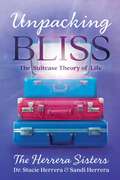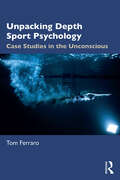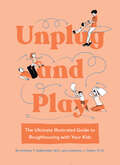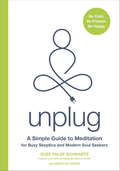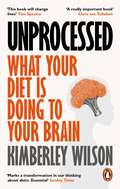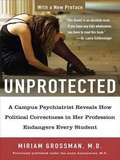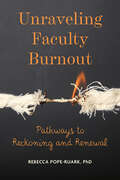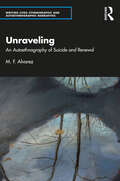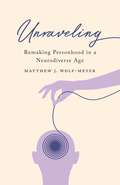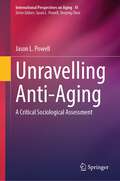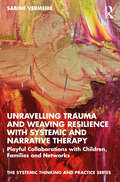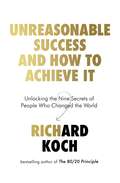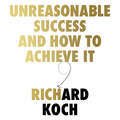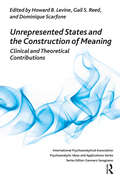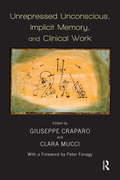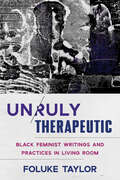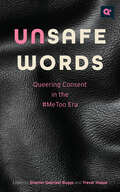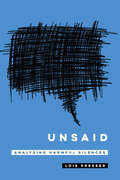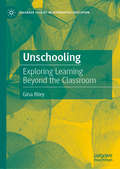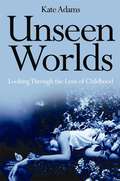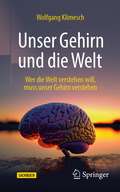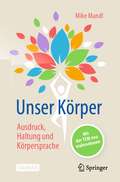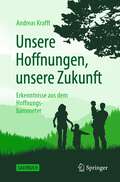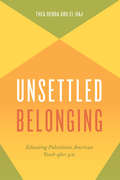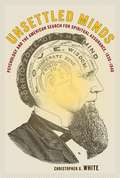- Table View
- List View
Unpacking Bliss: The Suitcase Theory of Life
by Sandi Herrera Stacie HerreraWhen was the last time you truly felt bliss? In Unpacking Bliss, Dr. Stacie Herrera and Sandi Herrera, sisters and cofounders of HumanizEDU, invite you on a transformative journey to rediscover your natural state of joy. Through self-reflection, neuroscience, and practical insights, this book helps you break free from limiting beliefs and unconscious patterns. Learn to align your thoughts, embrace your unique strengths, and live authentically. By building self-trust and uncovering your core values, you&’ll develop the confidence to shine your light and deepen your connections with others. Unpacking Bliss is a warm and empowering guide to creating a life of intention, connection, and joy. Let this book be your roadmap to a more blissful you. About The Herrera Sisters Stacie and Sandi, cofounders of HumanizEDU, are passionate about bringing the human back to the center of education. Growing up in Big Bear Lake, CA, they developed a deep commitment to creating safe, empowering, and collaborative environments where students, educators, and communities can thrive. Their mission is to cultivate psychologically safe environments, helping schools become trusted places to work and learn, addressing the mental health crisis in our schools with a systemic and human-centered approach.
Unpacking Depth Sport Psychology: Case Studies in the Unconscious
by Tom FerraroThis book utilizes a wealth of case studies to demonstrate the importance of using depth sport psychology to explore and understand athletes’ unconscious feelings and fears, and provides the knowledge needed to help athletes deal with pressures faced throughout their sporting career. Applying the theories of Sigmund Freud, Alfred Adler, Carl Jung, Margaret Mahler, Melanie Klein, Heinz Kohut, Donald Winnicott, and Christopher Bollas to explain the dynamics within the athlete’s mind, this useful resource will help develop a better understanding of athlete’s repressed feelings and psychological states. It looks past the cognitive behavioural techniques currently used to aid athletes, and instead focuses on the many ways the unconscious subtly influences athletes, offering an important a paradigm shift. Covering a range of different athletes within various sports, each chapter demonstrates how the psychoanalytic techniques of free association, the working alliance, analytic interpretations, confrontation, dream analysis, transference/counter transference and resistance analysis are used with athletes. Case studies cover such topics as the treatment of anxiety, yips, anger, guilt and perfectionism in the athlete, the influence of birth order, psychological defences used by athletes including gamesmanship, dissociation and humor, and the psychology of injury. Unpacking Depth Sport Psychology is the ideal resource for students, the educated athlete, parents, professors, sport psychologists, and coaches who hope to improve the athletes’ performance.
Unplug and Play: The Ultimate Illustrated Guide to Roughhousing with Your Kids
by Lawrence J. Cohen Anthony T. DeBenedetLearn how rough-and-tumble play can nurture relationships, lead to closer connections, encourage resilience, and boost confidence in kids—with 45 illustrated activities to get you started.Every kid needs horseplay! Roughhousing is an essential part of childhood development—but it is increasingly overshadowed by screens and structured activities. In Unplug and Play, a doctor and a child psychologist, both dads, introduce parents to the benefits of physical play for young children. Drawing from gymnastics, martial arts, ballet, team sports, and even animal behavior, the authors present fun full-contact activities for parents and children to enjoy together, including: Human CannonballMagic Carpet RideSteamrollerJoustingRaucous Pillow FightAnd more!With activities for everyone from toddlers to kids ages 12 and up, you&’ll build a foundation for a lifetime of enriching physical play.Previously published as The Art of Roughhousing, this updated edition incorporates new child development research and addresses the changing role of screen time.
Unplug: A Simple Guide to Meditation for Busy Skeptics and Modern Soul Seekers
by Debra Goldstein Suze Yalof SchwartzWhether you're a Fortune 500 CEO or someone bogged down with a never-ending to-do list, the proven secret to being more effective and living a happier, healthier life is to hurry up and slow down, to unplug. Studies show that you can get more done - and do it better- by doing less, just by consciously unplugging for a few minutes each day and meditating. This revolutionary book by the founder and CEO of the groundbreaking LA-based meditation studio Unplug Meditation brilliantly simplifies this powerful practice and shows the overwhelmed and overworked how easy it is to unplug in order to relieve stress, regain focus, and recharge. This modernized approach to meditation will appeal to anyone, even if - especially if - you believe you have no time, you can't sit still, or that "it's just not you." Schwartz debunks the common misperceptions about meditation, including the notion that you need to sit still for long periods of time, or that you need to "turn off your brain." She also shares the life-changing benefits you will experience, the proven science of how meditation literally changes your brain, as well as easy techniques and tips to easily incorporate meditation into your daily life.From the Hardcover edition.
Unprocessed: How the Food We Eat Is Fuelling Our Mental Health Crisis
by Kimberley WilsonWe all know that as a nation our mental health is in crisis. But what most don't know is that a critical ingredient in this debate, and a crucial part of the solution - what we eat - is being ignored.Nutrition has more influence on what we feel, who we become and how we behave than we could ever have imagined. It affects everything from our decision-making to aggression and violence. Yet mental health disorders are overwhelmingly treated as 'mind' problems as if the physical brain - and how we feed it - is irrelevant. Someone suffering from depression is more likely to be asked about their relationship with their mother than their relationship with food.In this eye-opening and impassioned book, psychologist Kimberley Wilson draws on startling new research - as well as her own work in prisons, schools and hospitals around the country - to reveal the role of food and nutrients in brain development and mental health: from how the food a woman eats during pregnancy influences the size of her baby's brain, and hunger makes you mean; to how nutrient deficiencies change your personality.We must also recognise poor nutrition as a social injustice, with the poorest and most vulnerable being systematically ignored. We need to talk about what our food is doing to our brains. And we need decisive action, not over rehearsed soundbites and empty promises, from those in power - because if we don't, things can only get worse.
Unprotected
by Miriam GrossmanOur campuses are steeped in political correctness-that's hardly news to anyone. But no one realizes that radical social agendas have also taken over campus health and counseling centers, with dire consequences. Psychiatrist Miriam Grossman knows this better than anyone. She has treated more than 2,000 students at one of America's most prestigious universities, and she's seen how the anything- goes, women-are-just-like-men, "safer-sex" agenda is actually making our sons and daughters sick. Dr. Grossman takes issue with the experts who suggest that students problems can be solved with free condoms and Zoloft. What campus counselors and health providers must do, she argues, is tell uncomfortable, politically incorrect truths, especially to young patients in their most vulnerable and confused moments. Instead of platitudes and misinformation, it's time to offer them real protection.
Unraveling Faculty Burnout: Pathways to Reckoning and Renewal
by Rebecca Pope-RuarkA timely book about assessing, coping with, and mitigating burnout in higher education.Faculty often talk about how busy, overwhelmed, and stressed they are. These qualities are seen as badges of honor in a capitalist culture that values productivity above all else. But for many women in higher education, exhaustion and stress go far deeper than end-of-the-semester malaise. Burnout, a mental health syndrome caused by chronic workplace stress, is endemic to higher education in a patriarchal, productivity-obsessed culture. In this unique book for women in higher education, Rebecca Pope-Ruark, PhD, draws from her own burnout experience, as well as collected stories of faculty in various roles and career stages, interviews with coaches and educational developers, and extensive secondary research to address and mitigate burnout. Pope-Ruark lays out four pillars of burnout resilience for faculty members: purpose, compassion, connection, and balance. Each chapter contains relatable stories, reflective opportunities and exercises, and advice from women in higher education.Blending memoir, key research, and reflection opportunities, Pope-Ruark helps faculty not only address burnout personally but also use the tools in this book to eradicate the systemic conditions that cause it in the first place. As burnout becomes more visible, we can destigmatize it by acknowledging that women are not unraveling; instead, women in higher education are reckoning with the productivity cult embedded in our institutions, recognizing how it shapes their understanding and approach to faculty work, and learning how they can remedy it for themselves, their peers, and women faculty in the future.Contributors: Lee Skallerup Bessette, Cynthia Ganote, Emily O. Gravett, Hillary Hutchinson, Tiffany D. Johnson, Bridget Lepore, Jennifer Marlow, Sharon Michler, Marie Moeller, Valerie Murrenus Pilmaier, Catherine Ross, Kristi Rudenga, Katherine Segal, Kryss Shane, Jennifer Snodgrass, Lindsay Steiner, Kristi Verbeke
Unraveling: An Autoethnography of Suicide and Renewal (Writing Lives: Ethnographic and Autoethnographic Narratives)
by M. F. AlvarezUnraveling: An Autoethnography of Suicide and Renewal is an autoethnographic story that explores the intricate relationship among trauma, marginality, and mental health. It follows Mike Alvarez, a precocious gay teenager from an immigrant Filipino family, who loses his grip on reality as he succumbs to so-called mental illness. Divided into two parts, the first half of the book uses evocative storytelling and in-the-moment narration to capture the slow descent into anxiety, paranoia, depression, and suicidality, as experienced by the author during young adulthood. The second half of the book critically reflects upon the story through a series of analytic chapters. In these chapters, the author considers the role of narrative in cultivating empathy for the mentally ill, the psychiatric-industrial complex’s obstruction of that empathy, and the moral dilemmas autoethnographers face when writing about self, other, and the social world. This book will be suitable for scholars in the social sciences, communication studies, and healthcare, who study and use autoethnography in their research. It will also be of value to those interested in firsthand accounts of madness, as told by members of marginalized communities.
Unraveling: Remaking Personhood in a Neurodiverse Age
by Matthew J. Wolf-MeyerDeveloping a cybernetic model of subjectivity and personhood that honors disability experiences to reconceptualize the category of the human Twentieth-century neuroscience fixed the brain as the basis of consciousness, the self, identity, individuality, even life itself, obscuring the fundamental relationships between bodies and the worlds that they inhabit. In Unraveling, Matthew J. Wolf-Meyer draws on narratives of family and individual experiences with neurological disorders, paired with texts by neuroscientists and psychiatrists, to decenter the brain and expose the ableist biases in the dominant thinking about personhood. Unraveling articulates a novel cybernetic theory of subjectivity in which the nervous system is connected to the world it inhabits rather than being walled off inside the body, moving beyond neuroscientific, symbolic, and materialist approaches to the self to focus instead on such concepts as animation, modularity, and facilitation. It does so through close readings of memoirs by individuals who lost their hearing or developed trauma-induced aphasia, as well as family members of people diagnosed as autistic—texts that rethink modes of subjectivity through experiences with communication, caregiving, and the demands of everyday life. Arguing for a radical antinormative bioethics, Unraveling shifts the discourse on neurological disorders from such value-laden concepts as &“quality of life&” to develop an inclusive model of personhood that honors disability experiences and reconceptualizes the category of the human in all of its social, technological, and environmental contexts.
Unravelling Anti-Aging: A Critical Sociological Assessment (International Perspectives on Aging #41)
by Jason L. PowellIn a society where youthfulness and vitality are highly valued, the quest for anti-aging solutions has become increasingly popularized in bio-medical gerontology. However, navigating the vast sea of information, products, and treatments can be overwhelming; there is limited academic rigor and theoretic critique from sociological perspectives. This book aims to demystify the concept of anti-aging and presents critical social approaches for maintaining a healthy life. By exploring the science, lifestyle factors, and power of bio-medicine, the book will provide readers with a comprehensive monograph to unlock the politics of anti-aging drawing from social approaches.
Unravelling Trauma and Weaving Resilience with Systemic and Narrative Therapy: Playful Collaborations with Children, Families and Networks (The Systemic Thinking and Practice Series)
by Sabine VermeireUnravelling Trauma and Weaving Resilience with Systemic and Narrative Therapy is an innovative book that details how clinicians can engage children, families and their networks in creative and collaborative relationships to elicit change within the context of trauma and violence. Combining systemic, narrative and dialogical theoretical frameworks with clinical examples, this volume focuses on therapeutic conversations that can help children, and those involved with them, deconstruct their experienced difficulties, and create more hopeful stories and alternative ways of relating to one another through a sense of play. Vermeire advocates for serious playfulness as a way of directly addressing trauma and its effects, as well as along ‘trauma-sensitive’ side paths. Puppetry, artwork, interviews and theatre play are used to weave networks of resilience in ever-widening circles and this approach is informed by the awareness that individual problems are always to be seen as relational, social and political. This book is an important read for therapists and social workers who work with traumatised children and their multi-stressed families.
Unreasonable Success and How to Achieve It: Unlocking the Nine Secrets of People Who Changed the World
by Richard KochHow do people of seemingly ordinary talent go on to achieve unexpected results? What can we learn from them? What are the ingredients for unreasonable success and how is it achieved?In this ground-breaking book, bestselling author Richard Koch charts a map of success, identifying the nine key attitudes and strategies can propel anyone to new heights of accomplishment.The pattern of success is fractal. It is endlessly varied but endlessly similar. Success does not require genius, consistency, all-round ability, a safe pair of hands or even basic competence. If it did, most of the people in this book would not have impacted the world as they did.Who could have predicted that Nelson Mandela, a once-obscure lawyer, could have averted disaster in South Africa, reconciling people of different heritages to each other and establishing a viable democracy? Or that Helena Rubinstein, a young woman growing up in the grotty ghetto of Kraków, could have changed the face of beauty throughout the world? Or that the illegitimate son of a notary would become one of the world's greatest painters, known universally by his first name, Leonardo?Successful people typically don't plan their success. Instead they develop a unique philosophy or attitude that works for them. They stumble across strategies which are shortcuts to success, and latch onto them. Events hand them opportunities they could not have anticipated. Often their peers with equal or greater talent fail while they succeed. It is too easy to attribute success to inherent, unstoppable genius.With this book, you can embark on a journey towards a new, unreasonably successful future.
Unreasonable Success and How to Achieve It: Unlocking the Nine Secrets of People Who Changed the World
by Richard KochHow do people of seemingly ordinary talent go on to achieve unexpected results? What can we learn from them? What are the ingredients for unreasonable success and how is it achieved?In this ground-breaking book, bestselling author Richard Koch charts a map of success, identifying the nine key attitudes and strategies can propel anyone to new heights of accomplishment.The pattern of success is fractal. It is endlessly varied but endlessly similar. Success does not require genius, consistency, all-round ability, a safe pair of hands or even basic competence. If it did, most of the people in this book would not have impacted the world as they did.Who could have predicted that Nelson Mandela, a once-obscure lawyer, could have averted disaster in South Africa, reconciling people of different heritages to each other and establishing a viable democracy? Or that Helena Rubinstein, a young woman growing up in the grotty ghetto of Kraków, could have changed the face of beauty throughout the world? Or that the illegitimate son of a notary would become one of the world's greatest painters, known universally by his first name, Leonardo?Successful people typically don't plan their success. Instead they develop a unique philosophy or attitude that works for them. They stumble across strategies which are shortcuts to success, and latch onto them. Events hand them opportunities they could not have anticipated. Often their peers with equal or greater talent fail while they succeed. It is too easy to attribute success to inherent, unstoppable genius.With this book, you can embark on a journey towards a new, unreasonably successful future.
Unrepresented States and the Construction of Meaning: Clinical and Theoretical Contributions (The International Psychoanalytical Association Psychoanalytic Ideas and Applications Series)
by Gail S. Reed Howard B. Levine Dominique ScarfoneIn the last several decades, the analytic field has widened considerably in scope. The therapeutic task is now seen by an increasing number of analysts to require that patient and analyst work together to strengthen, or to create, psychic structure that was previously weak, missing, or functionally inoperative. This view, which may apply to all patients, but is especially relevant to the treatment of non-neurotic patients and states of mind, stands in stark contrast to the more traditional assumption that the therapeutic task involves the uncovering of the unconscious dimension of a present pathological compromise formation that holds a potentially healthy ego in thrall. The contrast which this book calls attention to is that which exists roughly between formulations of psychic structure and functioning that were once assumed to have been sufficiently well explained by the hypotheses of Freud's topographic theory and those that were not. The former are modeled on neurosis and dream interpretation, where conflicts between relatively well-defined (saturated) and psychically represented desires were assumed to operate under the aegis of the pleasure-unpleasure principle.
Unrepressed Unconscious, Implicit Memory, and Clinical Work
by Giuseppe CraparoUnrepressed Unconscious, Implicit Memory, and Clinical Work analyses the psychological and neurobiological characteristics of what nowadays goes under the name of "unrepressed unconscious", as opposed to Freud's earlier version of a kind of "repressed unconscious" encountered and described initially in his work with hysterical patients. Pioneering Italian psychoanalyst and neuroscientist Mauro Mancia has distinguished this seminal Freudian concept from an earlier version of the unconscious (preverbal and pre-symbolic) that he terms "unrepressed", and which he describes as "having its foundations in the sensory experiences the infant has with his mother (including hearing her voice, which recalls prosodic experiences in the womb). In connection with this description of two different kinds of unconscious, a 'double' system of memory has been identified: if a traumatic event or series of events takes place when the nervous system is not ready to encode them linguistically and register them within the declarative memory system, they leave a trace within the implicit memory and particularly within the right brain, which both Mancia and Schore see as the seat of implicit memory.
Unruly Therapeutic: Black Feminist Writings and Practices in Living Room
by Foluke TaylorCentering the experiences of black women allows for richer therapeutic practices for everyone. “Black feminisms have provided a foundation from which it becomes more possible to speak and write of interconnection—of a spirited life, soul, a natural mystic blowing through the air—and engagement with all of this in therapeutic practice.” Part thesis, part memoir, and part poetry, this book is unlike any other therapeutic text. Psychotherapist and writer Foluke Taylor explores how the centering of black women’s experiences in therapeutic scholarship allows for greater space—space for wandering, for wondering, and for deepening narratives—in every therapeutic relationship. Beginning with the book’s poetic structuring, Taylor rejects the need for a streamlined solution, instead inviting the reader to take a different path through her crucial research—one that is unruly, nonlinear, and celebratory of the richer, fuller narratives allowed for by black feminisms.
Unsafe Words: Queering Consent in the #MeToo Era (Q+ Public)
by Gloria González-López Jane Ward Trevor Hoppe Angela Jones Anahi Russo Garrido Alexander Cheves Mistress Velvet D. S. Trumbull Blu Buchanan Shantel Gabrieal Buggs James McMaster Mark S. King V. Jo Hsu Dominique MorganQueer people may not have invented sex, but queers have long been pioneers in imagining new ways to have it. Yet their voices have been largely absent from the #MeToo conversation. What can queer people learn from the #MeToo conversation? And what can queer communities teach the rest of the world about ethical sex? This provocative book brings together academics, activists, artists, and sex workers to tackle challenging questions about sex, power, consent, and harm. While responding to the need for sex to be consensual and mutually pleasurable, these chapter authors resist the heteronormative assumptions, class norms, and racial privilege underlying much #MeToo discourse. The essays reveal the tools that queer communities themselves have developed to practice ethical sex—from the sex worker negotiating with her client to the gay man having anonymous sex in the back room. At the same time, they explore how queer communities might better prevent and respond to sexual violence without recourse to a police force that is frequently racist, homophobic, and transphobic. Telling a queerer side of the #MeToo story, Unsafe Words dares to challenge dogmatic assumptions about sex and consent while developing tools and language to promote more ethical and more pleasurable sex for everyone.
Unsaid: Analyzing Harmful Silences
by Lois PresserHarm takes shape in and through what is suppressed, left out, or taken for granted. This book is a guide to understanding and uncovering what is left unsaid—whether concealed or silenced, presupposed or excluded. Drawing on a variety of real-world examples, narrative criminologist Lois Presser outlines how to determine what or who is excluded from textual materials. With strategies that can be added to the tool kits of social researchers and activists alike, Unsaid provides a richly layered approach to analyzing and dismantling the power structures that both create and arise from what goes without saying.
Unschooling: Exploring Learning Beyond the Classroom (Palgrave Studies in Alternative Education)
by Gina RileyThis book explores the history of the unschooling movement and the forces shaping the trajectory of the movement in current times. As an increasing number of families choose to unschool, it becomes important to further study this philosophical and educational movement. It is also essential to ascribe theory to the movement, to gain greater understanding of its workings as well as to increase the legitimacy of unschooling itself. In this book, Riley provides a useful overview of the unschooling movement, grounding her study in the choices and challenges facing families as they consider different paths towards educating their children outside of traditional school systems.
Unseen Worlds
by Kate AdamsThe child's world often revolves around dreams and fantasy. Imaginary friends, places and play can seem entirely real, and yet in dismissing these as 'just your imagination', many adults cut a tie that can be the key to understanding a child. Unseen Worlds explores children's experiences of creative play, fairies, angels, imaginary friends, dreams and seeing deceased relatives alongside the more frightening realms of nightmares and the unexplained. It breaks new ground by giving voice to children of various ages to express how they encounter these different worlds and why they often keep them a secret. Kate Adams emphasises that whilst many adults forget what it feels like to be a child, developing a little empathy and understanding can enhance relationships with children and lead to positive change, both in parenting and professional practice. This insightful book will be of great interest to educators, counsellors, youth and community workers, childcare providers, parents and anybody else who seeks to understand, nurture, and strengthen relationships with children of all ages.
Unser Gehirn und die Welt: Wer die Welt verstehen will, muss unser Gehirn verstehen
by Wolfgang KlimeschEs gibt verschiedene Zugänge zur Erforschung des Gehirns. Hier wird in einem ersten Schritt die evolutive Perspektive gewählt. In gewisser Hinsicht ‚erzählt‘ die Gehirnanatomie die evolutive Entwicklung, weil bekannt ist, welche Regionen sich sehr früh und welche sich später entwickelt haben. So nennt man z.B. eine im menschlichen Gehirn sehr alte Region, den Hirnstamm auch ‚Reptiliengehirn‘, weil sie in ihrer Struktur große Ähnlichkeiten mit den Gehirnen von Reptilien hat.Die erste Hälfte des Buches beschäftigt sich mit der Frage, was uns antreibt und ob wir einen freien Willen haben. Es wird argumentiert, dass uralte Gehirnregionen über endogene Aktivierungen - auf die wir bewusst zumindest nicht direkt Einfluss nehmen können - unser Verhalten anleiten, d.h. mit einem gewissen Spielraum steuern. Zu ihnen gehören nicht nur der Wach-Schlaf Zyklus, sondern verschiedene Verhaltensanleitung, die im Dienste des Überlebens und der Reproduktion stehen. Viele dieser Verhaltensanleitungen sind Emotionen, die unser Verhalten in der sozialen Welt lenken. Kein Wunder, dass unser Gehirn primär auf all das spezialisiert ist, was in der sozialen Welt im Vordergrund steht: Kommunikation, soziale Intelligenz, Reproduktion und Brutpflege.Die zweite Hälfte beschäftigt sich mit der Anatomie und Physiologie kognitiver Prozesse. Dabei zeigt sich, dass die Grundlagen der Kognition völlig anders sind, als jene, die Emotionen zugrunde liegen. Im Mittelpunkt steht die Beobachtung, dass die elektrische Aktivität des Gehirns aus Schwingungen besteht und dass Gedächtnis, Denken und Bewusstsein ohne sie nicht möglich sind. Es wird hervorgehoben, dass Gehirnfunktionen 4-dimensional sind, weil sie neben der 3-dimensionalen Ausbreitung neuronaler Netze nur in der Zeit - als 4. Dimension – beschrieben werden können. Es wird gezeigt, dass Gehirnzeit Struktur hat, die als Hierarchie von Gehirn- und Körperschwingungen mathematisch beschrieben werden kann. Die Untersuchung von Gehirnschwingungen führt uns in die algorithmische Welt. In einem abschließenden Kapitel werden Zusammenhänge zwischen sozialer, physischer und algorithmischer Welt diskutiert.
Unser Körper - Ausdruck, Haltung, Körpersprache: Mit der TCM neu wahrnehmen
by Mike MandlWer sind wir in körperlicher Hinsicht? Was sagt unser Erscheinungsbild über uns? Und was hat das alles mit chinesischer Medizin zu tun? Um diese Fragen zu beantworten, müssen wir uns nur betrachten. Unser Körper spricht zu uns. Durch seine Formen, seine Strukturen, seine Ausprägung. Er erzählt uns spannende und lehrreiche Geschichten: Über unsere Herkunft und unseren Werdegang. Über unseren Status Quo und unsere Zukunft. Er berichtet von Möglichkeiten und Grenzen, von Stärken und Schwächen, von Vorlieben und Abneigungen. Er kann uns helfen, uns selber besser kennen zu lernen. Vorausgesetzt: Wir verstehen seine Sprache. Die Sprache unseres Körpers zu erlernen, ist das Ziel dieses Buches. Der Autor vergleicht dabei Menschen mit Bäumen, spricht von Fünf Elementen, widmet sich den drei Schätzen und ist der Meinung, dass Kondition und Konstitution auf einen Nenner kommen sollen. Das wirkt auf den ersten Blick chinesisch, im zweiten Blick ist es sogar, weil eine Grundlage dieses Buches die Traditionelle Chinesische Medizin ist. Das alles wird serviert mit Leichtigkeit und einer Prise Humor: Geschichten von Kopf bis Fuß.
Unsere Hoffnungen, unsere Zukunft: Erkenntnisse aus dem Hoffnungsbarometer
by Andreas KrafftWie können wir Krisen bewältigen und die gemeinsame Zukunft gestalten?Seit Beginn der Corona-Pandemie werden wir alle vor eine immense Belastungsprobe gestellt. Dabei zeigt sich, wie die Menschheit mit solchen Situationen erfolgreich und konstruktiv umgehen und das Beste daraus machen kann. Und wir lernen, dass die Zukunft nicht etwas ist, was uns widerfährt, sondern wir diese aktiv und konstruktiv gestalten können. Grundvoraussetzung dafür ist eine Haltung der Offenheit, der gegenseitigen Hilfsbereitschaft und der Hoffnung. Dieses Sachbuch berichtet in anschaulicher Weise über die aktuell vorherrschenden Zukunftsbilder und die gemeinsamen Sehnsüchte sowie über die Hoffnungs- und Handlungsfähigkeit der Menschen. Es offenbart die Macht wünschenswerter Zukunftsbilder und einer kollektiven Hoffnung als Gegenteil von allgemeiner Hilfslosigkeit oder von blindem und naivem Optimismus. Die zentralen Aussagen dieses Buches basieren auf Erfahrungen tausender Personen in mehr als zehn Ländern, die in den Jahren 2019 und 2020 an der wissenschaftlichen Studie des Hoffnungsbarometers teilgenommen haben. In einzigartiger Weise wird dadurch die gelebte Praxis mit den neuesten Erkenntnissen der sozialwissenschaftlichen Zukunftsforschung, der positiven Psychologie und der pragmatischen Philosophie verknüpft. Zielgruppen:Dieses Buch ist für alle, die hoffnungsvoll in die Zukunft blicken möchten. Es bietet konkrete Antworten auf zentrale Fragen und zeigt auf, wie Krisen überwunden werden und dabei eine bessere Zukunft für den Einzelnen und die gesamte Gesellschaft gestaltet werden kann. Zum Autor:Dr. Andreas M. Krafft unterrichtet an der Universität St. Gallen sowie an der Freien Universität Berlin. Als Co-Präsident von swissfuture, der Schweizerischen Vereinigung für Zukunftsforschung, sowie als Vorstandsmitglied der Schweizerischen Gesellschaft für Positive Psychologie leitet er das internationale Forschungsnetzwerk des Hoffnungsbarometers.
Unsettled Belonging: Educating Palestinian American Youth after 9/11
by Thea Renda Abu El-HajUnsettled Belonging tells the stories of young Palestinian Americans as they navigate and construct lives as American citizens. Following these youth throughout their school days, Thea Abu El-Haj examines citizenship as lived experience, dependent on various social, cultural, and political memberships. For them, she shows, life is characterized by a fundamental schism between their sense of transnational belonging and the exclusionary politics of routine American nationalism that ultimately cast them as impossible subjects. Abu El-Haj explores the school as the primary site where young people from immigrant communities encounter the central discourses about what it means to be American. She illustrates the complex ways social identities are bound up with questions of belonging and citizenship, and she details the processes through which immigrant youth are racialized via everyday nationalistic practices. Finally, she raises a series of crucial questions about how we educate for active citizenship in contemporary times, when more and more people's lives are shaped within transnational contexts. A compelling account of post-9/11 immigrant life, Unsettled Belonging is a steadfast look at the disjunctures of modern citizenship.
Unsettled Minds: Psychology and the American Search for Spiritual Assurance, 1830–1940
by Christopher G. WhiteThe book examines the concept of religion by turning to the religious lives of nineteenth- and twentieth-century Americans who rejected older religious traditions and turned to scientific psychologies to help them formulate new ideas about the self and new practices concerning spiritual growth.
